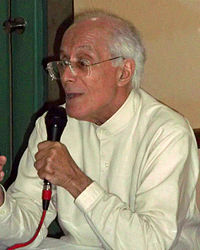Ahmed Ounaies | |
|---|---|
 | |
| Minister of Foreign Affairs of Tunisia | |
| In office 27 January 2011 – 13 February 2011 | |
| President | Fouad Mebazaa (Acting) |
| Prime Minister | Mohamed Ghannouchi |
| Preceded by | Kamel Morjane |
| Succeeded by | Mouldi Kefi |
| Personal details | |
| Born | 25 January 1936 Tunis, Tunisia |
Ahmed Ounaies, also spelled Ahmed Ounaiss, (born 25 January 1936) is a Tunisian politician and diplomat who was Foreign Minister for two weeks in the transitional government established after the 2010–2011 Tunisian uprising. Public pressure forced him to resign a week after controversially praising French Minister Michèle Alliot-Marie, who openly supported Ben Ali and helped deliver tear gas to police forces.
His predecessor who was Ben Ali's foreign minister — Kamel Morjane — had also resigned from his post. [1] His successor — Mouldi Kefi — was appointed on 21 February 2011. [2]
Minister of Foreign Affairs
On January 29, after a week of protests in Egypt he said Tunisia and Egypt are different and both must "chart their own course". [3] He also emphasized that Tunisia was not going to involve itself in Egypt. [3]
Controversy and resignation
During his trip to Paris, [4] he angered many Tunisians by stating he had always dreamed of meeting French Foreign Minister Alliot-Marie. [2] He went on to praise her by stating she was "above all a friend of Tunisia". [4] [5] In Tunis, about 300 employees of the foreign ministry staged a protest rally outside their workplace to demand that he step down after his comments. [6] Hundreds more joined the protest. [1]
After only two weeks as foreign minister, he resigned on 13 February 2011. [1] [7]
Honours
- 2018 : Grand officier of the National Order of Merit of Tunisia [8]
See also
References
- ^ a b c "Tunisian Foreign Minister Resigns" Al Jazeera English. 13 February 2011. Web. 13 February 2011.
- ^ a b Amara, Tarek, and Richard Valdmanis. "CORRECTED-Tunisia Names New Foreign Minister" Reuters.com. Africa Reuters, 21 February 2011. Web. 10 April 2011.
- ^ a b Ben Bouazza, Bouazza (29 January 2011). "Tunisian minister: Egypt must chart its own path". boston.com. Associated Press. Retrieved 13 July 2015.
- ^ a b "Tunisia names new foreign minister". Saudi Gazette. Agence France-Presse. 10 April 2011. Archived from the original on 14 July 2015. Retrieved 13 July 2015.
- ^ "Tunisia Foreign Minister Steps down" Archived 2011-02-14 at the Wayback Machine Arab News. 13 February 2011. Web. 13 February 2011.
- ^ Amara, Tarek, and Christian Lowe. "Tunisia Calls up Army Reserve to Tackle Violence" Archived 2011-02-12 at the Wayback Machine Reuters.com. 7 February 2011. Web. 8 February 2011.
- ^ Démission du ministre des affaires étrangères tunisien
- ^ "Les ambassadeurs Ounaies, Khemiri, Bach Tobji, Kahloun et Faouri décorés par le président Caïd Essebsi". 2018-07-31.
Ahmed Ounaies | |
|---|---|
 | |
| Minister of Foreign Affairs of Tunisia | |
| In office 27 January 2011 – 13 February 2011 | |
| President | Fouad Mebazaa (Acting) |
| Prime Minister | Mohamed Ghannouchi |
| Preceded by | Kamel Morjane |
| Succeeded by | Mouldi Kefi |
| Personal details | |
| Born | 25 January 1936 Tunis, Tunisia |
Ahmed Ounaies, also spelled Ahmed Ounaiss, (born 25 January 1936) is a Tunisian politician and diplomat who was Foreign Minister for two weeks in the transitional government established after the 2010–2011 Tunisian uprising. Public pressure forced him to resign a week after controversially praising French Minister Michèle Alliot-Marie, who openly supported Ben Ali and helped deliver tear gas to police forces.
His predecessor who was Ben Ali's foreign minister — Kamel Morjane — had also resigned from his post. [1] His successor — Mouldi Kefi — was appointed on 21 February 2011. [2]
Minister of Foreign Affairs
On January 29, after a week of protests in Egypt he said Tunisia and Egypt are different and both must "chart their own course". [3] He also emphasized that Tunisia was not going to involve itself in Egypt. [3]
Controversy and resignation
During his trip to Paris, [4] he angered many Tunisians by stating he had always dreamed of meeting French Foreign Minister Alliot-Marie. [2] He went on to praise her by stating she was "above all a friend of Tunisia". [4] [5] In Tunis, about 300 employees of the foreign ministry staged a protest rally outside their workplace to demand that he step down after his comments. [6] Hundreds more joined the protest. [1]
After only two weeks as foreign minister, he resigned on 13 February 2011. [1] [7]
Honours
- 2018 : Grand officier of the National Order of Merit of Tunisia [8]
See also
References
- ^ a b c "Tunisian Foreign Minister Resigns" Al Jazeera English. 13 February 2011. Web. 13 February 2011.
- ^ a b Amara, Tarek, and Richard Valdmanis. "CORRECTED-Tunisia Names New Foreign Minister" Reuters.com. Africa Reuters, 21 February 2011. Web. 10 April 2011.
- ^ a b Ben Bouazza, Bouazza (29 January 2011). "Tunisian minister: Egypt must chart its own path". boston.com. Associated Press. Retrieved 13 July 2015.
- ^ a b "Tunisia names new foreign minister". Saudi Gazette. Agence France-Presse. 10 April 2011. Archived from the original on 14 July 2015. Retrieved 13 July 2015.
- ^ "Tunisia Foreign Minister Steps down" Archived 2011-02-14 at the Wayback Machine Arab News. 13 February 2011. Web. 13 February 2011.
- ^ Amara, Tarek, and Christian Lowe. "Tunisia Calls up Army Reserve to Tackle Violence" Archived 2011-02-12 at the Wayback Machine Reuters.com. 7 February 2011. Web. 8 February 2011.
- ^ Démission du ministre des affaires étrangères tunisien
- ^ "Les ambassadeurs Ounaies, Khemiri, Bach Tobji, Kahloun et Faouri décorés par le président Caïd Essebsi". 2018-07-31.